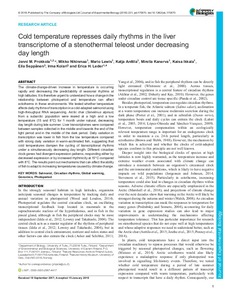Cold temperature represses daily rhythms in the liver transcriptome of a stenothermal teleost under decreasing day length
Kaisa Ikkala; Mirella Kanerva; Jenni M. Prokkola; Mario Lewis; Mikko Nikinmaa; Erica H. Leder; Irma Kolari; Katja Anttila; Eila Seppänen
Cold temperature represses daily rhythms in the liver transcriptome of a stenothermal teleost under decreasing day length
Kaisa Ikkala
Mirella Kanerva
Jenni M. Prokkola
Mario Lewis
Mikko Nikinmaa
Erica H. Leder
Irma Kolari
Katja Anttila
Eila Seppänen
COMPANY OF BIOLOGISTS LTD
Julkaisun pysyvä osoite on:
https://urn.fi/URN:NBN:fi-fe2021042719006
https://urn.fi/URN:NBN:fi-fe2021042719006
Tiivistelmä
The climate-change-driven increase in temperature is occurring rapidly and decreasing the predictability of seasonal rhythms at high latitudes. It is therefore urgent to understand how a change in the relationship between photoperiod and temperature can affect ectotherms in these environments. We tested whether temperature affects daily rhythms of transcription in a cold-adapted salmonid using high-throughput RNA sequencing. Arctic char (Salvelinus alpinus) from a subarctic population were reared at a high and a low temperature (15 and 8 degrees C) for 1 month under natural, decreasing day length during late summer. Liver transcriptomes were compared between samples collected in the middle and towards the end of the light period and in the middle of the dark period. Daily variation in transcription was lower in fish from the low temperature compared with strong daily variation in warm-acclimated fish, suggesting that cold temperatures dampen the cycling of transcriptional rhythms under a simultaneously decreasing day length. Different circadian clock genes had divergent expression patterns, responding either by decreased expression or by increased rhythmicity at 15 degrees C compared with 8 degrees C. The results point out mechanisms that can affect the ability of fish to adapt to increasing temperatures caused by climate change.
Kokoelmat
- Rinnakkaistallenteet [19250]
